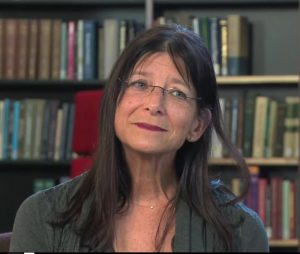Facing the Facts: Self Disclosure and the Analytic Relationship Swimming in Dark Places
by Stephanie Brody, PsyD
In lieu of an abstract, here is a brief excerpt of the content:

Facing the facts. Never has this phrase meant so much to me. Over this year, simply showing up in the rectangular frame has been an act of disclosure. A convergence of the viral, political, racial, and personal—on both sides. In past years, our discussions have focused on intrusion, deliberate, accidental… inevitable. We have shared life events, medical diagnoses, losses and personal grenades that impact our work. Each, forms of disclosure and dyadic reckonings, repairs and opportunities, have also been stories that raise our awareness and have set the stage for our discussion. Each time, we have explored the life we live in the work that we do, every day. But this year has been a different kind of year. So many, most of us here, have had the privilege of working, but all of us have had to weather the hard knock of encroaching reality. The norms that we took for granted, as individuals, as a society, and as a country have been altered. What is it like to work in this new reality? We are here today to tell you stories about being in and out of time, in and out of ourselves, grappling with the shared realities, the familiarity and the strangeness of it, and to talk together, on this unique platform about how we will be wrestling with it for years to come. The stories we are telling today are being written for the first time, in the here and now of a new world. We are learning to be, in a place that is unlike the before, an unknown that is becoming something…familiar <…>
American Imago, Volume 78, Number 3, Fall 2021, pp. 485-490.
Link to Online Publication [fulltext can be requested from the library].
About the Author

Stephanie R. Brody is a Supervising and Training Analyst at the Boston Psychoanalytic Society and Institute (BPSI), a Lecturer in Psychology (part-time) in the Department of Psychiatry at Harvard Medical School, and a Clinical Associate and Attending Psychologist at McLean Hospital. She is the author of Entering Night Country: Psychoanalytic Reflections on Loss and Resilience (Routledge, 2016) and Co-Editor (with Fran Arnold) of Psychoanalytic Perspectives on Women and their Experience of Desire, Ambition and Leadership (Routledge, 2019). Watch Stephanie Brody’s interview about Entering Night Country, recorded in the BPSI Library in April, 2016. Dr. Brody maintains a private practice in Lexington, MA.
Previous Posts:
Sarah Ackerman, PhD (2021). Psychoanalysis from the Inside Out: Developing and Sustaining an Analytic Identity and Practice by Lena Ehrlich, London and New York, Routledge, 2020, 169 pp. The International Journal of Psychoanalysis, 102(4): 822-826.
Lewis Kirshner, MD (2020). Trauma by Lucy Bond and Stef Craps. London: New Critical Idiom, Routledge, 2019, 173 pp. American Imago, 77(4), 800-808.
Cuneyt Iscan, MD (2021). Large-Group Psychology: Racism, Societal Divisions, Narcissistic Leaders, and Who We Are Now, by Vamik D. Volkan, Phoenix Publishing House Ltd, Oxfordshire, UK, 2020, 139 pp. American Journal of Psychoanalysis, 81: 244–248.
José Saporta, MD (2021). Psychoanalysis and Our Cultural Crisis. Subject, Action, & Society: Psychoanalytical Studies and Practices, 1(1): 91-109.
Elsa Ronningstam, PhD, Mark Goldblatt, MD, Mark Schechter, MD, Benjamin Herbstman, MD (2021). Facing a patient’s suicide—The impact on therapists’ personal and professional identity. Practice Innovations, 6(2), 89–106.
Anton O. Kris, MD (2021). Love Is the Great Educator: Response to Richard Frank and Mel Bornstein. Psychoanalytic Inquiry, 41(4-5), 289-291.
Alex Hoffer, MD (2020). Psychoanalysis as a Two-Person Meditation: Free Association, Meditation, and Bion. The American Journal of Psychoanalysis, 80(3): 331–341.
Nancy J. Chodorow, PhD. (2021). Women Mothers Daughters: The Reproduction of Mothering After Forty Years. In Bueskens, P., ed. Nancy Chodorow and The Reproduction of Mothering: Forty Years On. Palgrave, pp. 49-80.
Anthony D. Bram, PhD. (2021). Introduction – In-Session Use of Digital Material in Child Psychoanalysis and Psychotherapy. The Psychoanalytic Study of the Child, 74(1): 304-307.
Steven H. Cooper, PhD. (2021). Toward an Ethic of Play in Psychoanalysis. The Psychoanalytic Quarterly, 90:3, 373-397.
Diane O’Donoghue, PhD. (2021). Amnesias of a Freudian Kind. Part One. American Imago 78(1), 55-77.
Charles Levin, PhD and Dawn Skorczewski, PhD. (2020).The Poetics of Boundary Violation: Anne Sexton and Her Psychiatrist. Psychoanalytic Dialogues, 30(2), 206-221.
Andrea Celenza, PhD (2020). Embodiment and the Perversion of Desire. The Psychoanalytic Quarterly, 89(3), 369-398.
Steven H. Cooper, PhD (2021). Donald Winnicott and Stephen Mitchell’s Developmental Tilt Hypothesis Reconsidered. Psychoanalytic Dialogues, 31(3), 355-370.
Elsa Ronningstam, PhD (2021). Cultural Function and Psychological Transformation of Silence in Psychoanalysis and Psychotherapy. In Dimitrijevic, A. and Buchholz, M.B., eds. (2021). Silence and Silencing in Psychoanalysis: Cultural, Clinical, and Research Perspectives. Routledge, pp. 105-127.
Paola M. Contreras, PsyD (2021). The Magical and the My-Person in Psychoanalysis During the Covid Pandemic. Journal of the American Psychoanalytic Association, 68(6): 1113-1126. Open Access, DOI: 10.1177/0003065120981733
Click here to see a full archive of featured papers. All articles can be requested from the library.

